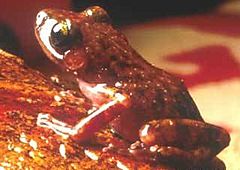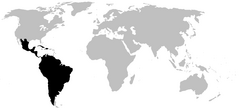Leptodactylidae facts for kids
Quick facts for kids Leptodactylidae |
|
|---|---|
 |
|
| Eleutherodactylus guttilatus | |
| Scientific classification | |
| Kingdom: | |
| Phylum: | |
| Class: | |
| Subclass: | |
| Order: | |
| Suborder: | |
| Superfamily: |
Hyloidea
|
| Family: |
Leptodactylidae
Werner, 1896
|
| Subfamilies | |
|
|
 |
|
| Distribution of Leptodactylidae (in black) | |
Leptodactylidae is a big family of frogs. Scientists believe these frogs have been on Earth for a very long time. They might have lived here since the end of the Mesozoic Era or during the Cenozoic Era. That's millions of years ago!
There are over 1,100 different kinds of Leptodactylidae frogs. These are grouped into about 50 main genera. The Eleutherodactylus group is the largest, with more than 700 different kinds of frogs in it.
Contents
Where Leptodactylidae Frogs Live
Leptodactylidae frogs can be found in many places. They live in Mexico and the Caribbean islands. You can also find them all over Central and South America.
These frogs are very adaptable. Some live on land (terrestrial). Others like to dig underground (burrowing). Some live mostly in water (aquatic). And some are good at climbing trees (arboreal).
Leptodactylidae Reproduction
Leptodactylidae frogs have interesting ways to lay their eggs. Some types of these frogs lay their eggs in foam nests. These nests can be found in different spots.
They might lay eggs in small cracks or crevices. Some lay them right on the surface of the water. Other frogs prefer to lay their eggs on the forest floor.
Tadpoles and Froglets
If the eggs are laid on the forest floor, the tadpoles will stay there. They will grow into frogs without eating anything. This is a special way they survive.
In the Eleutherodactylus group, something even more amazing happens. Their eggs hatch directly into tiny frogs! They completely skip the tadpole stage. This means they don't need water to develop.
Ancient Leptodactylidae Frogs
Scientists have found Leptodactylidae frogs in fossil records. This helps us learn about their history. One fossil was found that was very well preserved.
This fossil is thought to be about 37 million years old. It shows that these frogs have been around for a very long time.
See also
 In Spanish: Leptodactílidos para niños
In Spanish: Leptodactílidos para niños
 | Ernest Everett Just |
 | Mary Jackson |
 | Emmett Chappelle |
 | Marie Maynard Daly |

